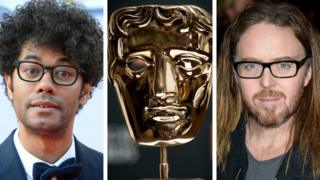 Image copyright
Getty Images
Image caption
Richard Ayoade (left) is hosting the event while Tim Minchin (right) is performing two songs
Image copyright
Getty Images
Image caption
Richard Ayoade (left) is hosting the event while Tim Minchin (right) is performing two songs
There is no red carpet at this year's Bafta TV Awards - unless, of course, the stars unfurl one in their homes.
That's because the event is being held as a closed studio, socially-distanced show in which awards are being accepted by their recipients virtually.
Master of ceremonies Richard Ayoade is being joined in the studio by some guest presenters, while others are announcing award winners online.
The pared-down event is being shown as-live on BBC One.
All the nominees were asked to supply a self-filmed acceptance speech before the event, to be screened should they win.
Friday's awards come two weeks on from the Bafta TV Craft Awards, which Stephen Mangan presented virtually on 17 July.
Sky Atlantic miniseries Chernobyl was the big winner at that event, winning seven prizes in all.
The fact-based drama is up for another three prizes at the Bafta TV Awards, including best miniseries and best leading actor.
Chernobyl's Jared Harris will battle The Virtues' Stephen Graham, Giri/Haji's Takehiro Hira and The Capture's Callum Turner for the prize.
Image copyright PA Media Image caption Award presenters Paul Mescal and Daisy Edgar-Jones ensure they are socially distancedGlenda Jackson is up for the female equivalent for her performance in Elizabeth Is Missing, her first television role in 27 years.
Jodie Comer, Suranne Jones and Samantha Morton are also shortlisted, for Killing Eve, Gentleman Jack and I Am Kirsty respectively.
Fleabag creator Phoebe Waller-Bridge will vie with co-star Sian Clifford for the female performance in a comedy programme award.
The BBC Three show's second series is also up for best scripted comedy, as well as the audience-voted "must-see moment" prize.
Waller-Bridge was up for a writing prize at the TV Craft Awards but lost out to Stath Lets Flats creator and star Jamie Demetriou.
Demetriou, who appeared in Fleabag's first series, has another shot at glory as a nominee for the male performance in a comedy programme award.
Others in contention for the prize include Man Like Mobeen's Guz Khan and Ncuti Gatwa from Netflix's Sex Education.
Overall there is a 22% increase of nominees of colour across the performance categories this year, compared with 2019.
The Bafta Film Awards faced criticism earlier this year for having all-white line-ups in all four of its acting categories.
Image copyright BBC/Tiger Aspect Image caption Man Like Mobeen tells of a Birmingham man trying to shake off his criminal pastDiversity only goes so far though, with this year's entertainment performance award being an all-male affair.
Frankie Boyle and Mo Gilligan will vie for the prize with Graham Norton and Lee Mack, who won this award in 2018 and 2019 respectively.
Friday's virtual ceremony will see 26 awards handed out, as well as a special Bafta for actor and producer Idris Elba.
The star of Luther and The Wire is being recognised for both his craft and for championing diversity and new talent.
Ayoade does not have it all to do, as a host of stars have been lined up to present the awards themselves.
Greg Davies, Stacey Dooley, Jessica Hynes and Normal People duo Daisy Edgar-Jones and Paul Mescal are among those joining him in the studio.
Image copyright BBC/STV Productions Image caption Glenda Jackson was last nominated for a Bafta TV Award in 1972Jeff Goldblum, Michael Sheen, David Tennant and Kermit the Frog, meanwhile, are on hand to present awards via video link, along with Ruth Madeley, Chris O'Dowd and Billy Porter.
Comedian Tim Minchin has also been enlisted to perform two songs, one of which he composed especially for the event.
The Australian, recently seen on Sky Atlantic in Upright, said he was "incredibly honoured" to be asked to contribute.
'Intervention into the industry'
Bafta chairman Krishnendu Majumdar told BBC Radio 5 Live on Thursday that all of the nominees had been asked to supply a self-filmed winner's speech, ahead of the event, in case they won (although no potential sad losers faces were requested, sadly).
He also told presenter Nihal Arthanayake "it was really important that we celebrated TV".
"It's so important at the moment, during lockdown, TV has really sustained and brought the nation together, and this is celebrating last year's work".
Majumdar went on to say it was "hugely important" for Bafta to see that TV production companies and channels were making diverse stories, with diverse teams. He pointed to the introduction of the BFI Diversity Standards criteria, of recent years, for awards applicants.
Image copyright Getty Images Image caption Bafta chair Krishnendu Majumdar said the organisation and charity was conducting a diversity reviewThe 90-minute awards were preceded by an hour-long pre-show, hosted by comedian Tom Allen on Bafta's social channels.
Bafta - the British Academy of Film and Television Arts - was founded in 1947 and has been presenting TV awards since 1955.
Follow us on Facebook or on Twitter @BBCNewsEnts. If you have a story suggestion email entertainment.news@bbc.co.uk.

 5 years ago
512
5 years ago
512 

